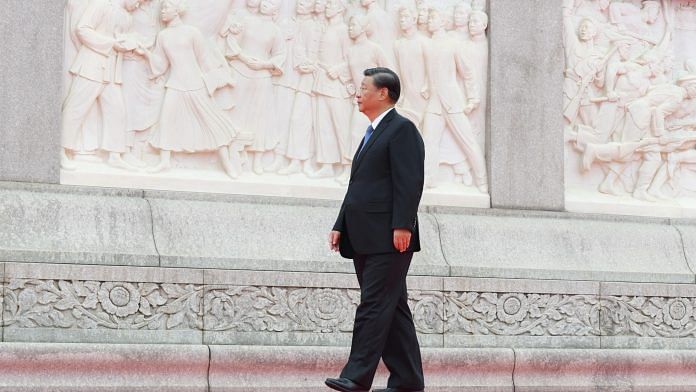Is China a democracy? Or is it a village-level democracy? US President Joe Biden’s Summit for Democracy this week has brought back this question. Many Chinese citizens have been schooled into believing that it is a real democracy, even though the rest of the world thinks otherwise.
Here are some key reasons why it is not one.
Biden’s decision to invite Taiwan to the 9-10 December virtual summit has rattled Beijing and it took to discredit the meeting.
“The US claims it does not support Taiwanese independence, yet it provides Taiwanese independence forces an international stage loudly and clearly,” said Chinese foreign minister Wang Yi while criticising US’ decision to invite Taiwan.
Also read: Glitz, glamour and gambling: Behind China’s secret societies and crime syndicates
Chinese justifications
Beijing went on to issue a white paper on “Chinese democracy”.
“Democracy is not an ornament, it is not to be used as a decoration, but to solve the problems that the people need to solve. The factor that decides if a country is democratic or undemocractic lies in whether the people are the masters of the country,” says the preface of the white paper on “Chinese democracy”.
The white paper provides a series of justifications for why China has its own version of “democracy”.
The first argument provided in the white paper for being a democracy is the National Party Congress’ role in creating a “grassroots democracy”.
“NPC deputies are tasked with carrying forth the opinions and expectations of grassroots people and blending them into the country’s top-level design,” says a 2017 Xinhua article on “China-style democracy”.
But the reality is that NPC merely rubber stamps the law, which the Politburo Standing Committee approves.
The second argument the white paper offers for China being a democracy is the selection of advisors for the Chinese People’s Political Consultative Conference. Instead of influencing CCP’s decision-making, the advisors for CPPCC work as an independent tool of the party to exercise its agenda in business, diplomacy, and cultural interactions.
The third argument – and probably the strongest – is that direct elections are held in China at the village level. A relative strengthening of village-level democracy was a trend that had surprised experts outside of China before Xi Jinping came to power.
But the village elections are increasingly staged where the CCP ensures their approved candidate for the village party secretary position wins.
The fourth and final argument is the existence of eight political parties in China. These political parties supported the CCP in 1948 to build a ‘New China’ under very different circumstances.
“It (China) had not completely and unequivocally cast away the idea of a path to democracy,” Deng had said about the CCP being open–minded about democracy between 1949-50.
Today, all eight political parties are nothing more than a decoration. The top members of these parties have, at times, themselves been members of the CCP.
Also read: China can’t use sports as soft power for long. 2022 Winter Olympics looks set to fail
Demand for democracy in China
The 1989 Tiananmen Movement was the first legitimate demand for democratic reforms in the country since the foundation of the People’s Republic of China.
In 1989, student protesters had sent a Seven-Point Petition (or demands) with a delegation to the Zhongnanhai – the official residence of the CCP leaders. The delegation held a piece of paper with their demands while kneeling in supplication, like before an emperor. But the CCP leaders didn’t show up to have a dialogue with the students.
Tiananmen Movement leaders emphasised that they were patriotic and had presented their demands to the CCP within the ambit of politics of the time. Instead, the CCP leaders completely denied any attempts to hold dialogue and sent in the People’s Liberation Army (PLA) to clear the protest. The rest is history.
The CCP denied the request for dialogue as that would have given legitimacy to the movement.
Since Tiananmen, the CCP has tried to co-opt the idea of democracy by investing in the narrative of the “Chinese version of democracy”.
Rather than explaining clearly why China should qualify as a democracy, the strategy Beijing adopts is to point at failures of the US democracy. China also points at inefficiencies in India’s electoral democracy.
The CCP doesn’t find it problematic to co-opt democracy because the official propaganda has tried to justify its own form of governance as democratic for years. The CCP does understand that, ultimately, its legitimacy rests on keeping people relatively satisfied and creating a notion of participation.
The CCP’s propaganda machinery has worked hard over the past days to underscore the significance of the white paper. The hashtag “the code of the rule of China” was viewed 470 million times on Weibo. The “code” was a reference to “democracy”.
Even though China’s white paper was widely ridiculed worldwide, people inside China understand its semantics.
“The purpose of this white paper is not to please anyone, or even to refute someone, but to put forward ‘own standards’. To take a second look at this position, we must build our discourse system”, said a Weibo user.
The source of this discourse building is a Chinese professor named Zhang Weiwei, the director of the Institute of China Studies, Shanghai Academy of Social Science. Zhang has advised top Chinese leadership about countering the narratives of the West for many years.
The CCP perpetuates the narrative that they have their consultative process, which is better than the electoral democracy. The narrative is important because the party creates a false notion of democracy exercised through technocratic participation.
In China, the idea of “democracy” is indeed a decoration for its own people.
The author is a columnist and a freelance journalist. He was previously a China media journalist at the BBC World Service. Views are personal.
(Edited by Anurag Chaubey)



